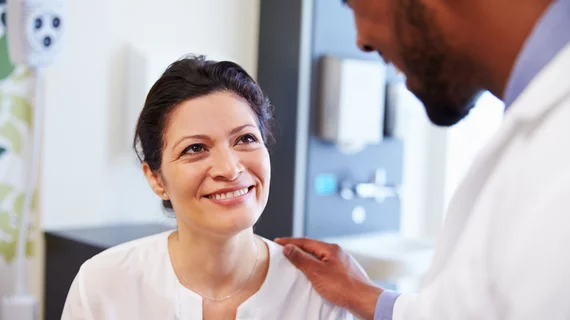Is laughter the best medicine? Why patients view a sense of humor as an admirable trait in radiologists
Perhaps educational institutions should start integrating knock-knock jokes into radiology curricula because patients apparently consider it an admirable quality in their care providers.
At least that’s what a new study that tested the effects of “humorous interventions” during breast cancer screenings and examinations found. Patients who were included in the intervention group reported feeling less anxious during their exam and more receptive to their discussions with the radiologist compared to a control group.
“The positive effects of humor in medicine are widely known, but the majority of patients experience little humor or joy in the contemporary medical setting,” corresponding author of the study, Andreas Gutzeit, from the Department of Health Sciences and Medicine at the University of Lucerne in Switzerland, and colleagues shared. “Studies have shown that diagnostic exams, especially breast examinations, are extremely stressful for patients.”
In the paper, the authors of the study discuss the role of radiologists in the future and whether those roles might reach beyond imaging experts to more patient-centric practices. Patient centered care would involve more communication and interaction, which prompted the experts to challenge what traits might benefit the patient-radiologist relationship the most.
This eventually led to the assessment of how radiologists who are considered more humorous would be viewed by their patients, and whether such a quality would help to exude a stronger sense of empathy to patients undergoing stressful examinations.
For the study, researchers divided a cohort of 132 women undergoing a routine mammography/ultrasound combo evenly into a control group and an intervention group. Before the examination, the intervention group received a self-painted, humorous business card from their radiologist in lieu of a standard business card, while the control group was given a standard business card.
Post-examination questionnaires completed by the patients revealed the simple intervention to be an effective means of easing patients’ minds. Patients in the intervention group were found to be more likely to remember their radiologist’s name, value their discussion more and view the provider as more empathetic. This also translated into a reduction in anxiety during the exam and a feeling of trust in the radiologist’s competence.
“Humor can be used as a means of alleviating the patient’s fear and anxiety and assist the radiologist in leaving a stronger impression on patients than other doctors although the radiologist does not visit the patient daily at the bedside,” the authors explained.
While this latest work supports the adage that laughter is the best medicine, the authors cautioned that not all humor techniques are created equal, and that psychological backgrounds should be considered.
To learn more about the study, visit Cancer Imaging.

